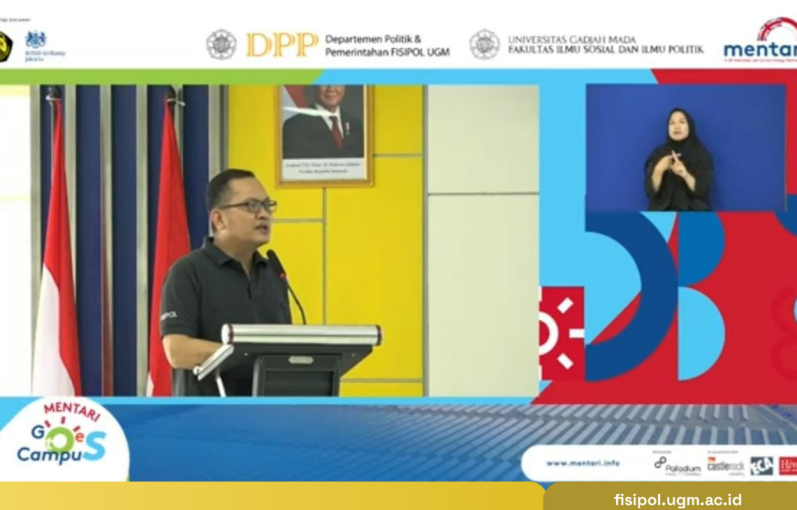
Yogyakarta, 21st of March, 2025—UGM’s Faculty of Social and Political Science supports the government efforts at carrying out a nation-wide energy transition scheme towards clean energy. Through intense cooperation with the Ministry of Energy and Mineral Resources of the Republic of Indonesia and the British Embassy in Jakarta, the MENTARI Initiation was organized on Friday (21/3) at Fisipol UGM.
Indonesia has strengthened its commitment towards Zero Emission by updating its National Energy Policy. It is stated that in 2023, as much as 23 percent of the total primary energy supply comes from sustainable energy.In the year 2050, it is targeted to be as high as 31 percent. Unfortunately, the progress towards the development of clean energy for Indonesia’s primary energy supply is stagnant, stuck at somewhere around 12 percent. This urgency requires various parties to collaborate with each other and create breakthrough innovations, so that it can endorse the utilization of clean renewable energy that is both stable and capable to accommodate the energy needs of the people.
Nurhadi, S.Sos., M.Si., Ph.D., as Vice Dean of Finance, Asset, and Human Resources Affairs of Fisipol UGM, mentioned that climate change has become one of the research umbrella for the faculty that oversees various important agendas. “Everywhere we go we can feel clean rooms, or clean air. However, where does it all come from? As a country, our energy still relies on coal. Fulfilling clean energy becomes a challenge towards resource exploitation to be controlled,” Nurhadi mentioned.
Indonesia’s dependence on fossil fuels is believed to be the root cause of why the transition towards clean energy is very slow. For years, Indonesia’s energy availability has been sustained by its rich natural resources, which includes its vast amount of fossil fuel reserves. Indonesia even became one of the biggest coal exporters in the world, actively supplying the world’s energy needs. Domestically, this is also the case, as coal energy is often maximally utilized in achieving the agenda of equitable distribution of electricity to communities everywhere.
The exploitative impact of fossil fuel has brought many worrying concerns. The whole process, which starts from land dredging, lack of effective governance, as well as distribution is seen to have caused long-term destructive effects. According to Nurhadi, rehabilitation efforts are needed while maximizing the utilization of clean energy in ensuring sustainability in energy availability. “This life is not only for us to enjoy, but also for the next generation forward”.
Along with the visible impacts of carbon emission which will inevitably speed up climate change, fossil fuels do not have a high economic value. The awareness to contribute towards lowering carbon emission is starting to grow. In line with that, the United Kingdom has also faced its share of problems in pushing the transition towards clean energy. Jet Gacusan, as the Deputy Head of Low Carbon Energy of the British Embassy in Jakarta, explained that there needs to be synchronization in utilizing clean energy while fulfilling the needs for economic growth.
Indonesia and the United Kingdom face similar challenges. “Through the current framework of cooperation, we want to develop researchers, ideas, collaboration, and experiments in pushing the agenda of clean energy transition for both countries,” Jet explained. In comparison to Indonesia, the United Kingdom has less fossil fuel reserves, which will only last at most for 4.5 years to the future. On the other hand, the potential for the UK’s sustainable energy is very big and it has also been maximally utilized. In 2019, the United Kingdom has successfully increased the supply of non-carbon energy sources to 48% of its national energy supply.
Jet also added that higher education can become a promising sector in fulfilling the agenda of energy transition. The British government intends to collaborate with the higher education sector, so as to capture ideas and innovations regarding renewable energy. With the MENTARI Initiation, it is hoped that strong commitment in multi-sectoral collaboration of governments, industries, and higher education can emerge, in an effort to create energy resilience, in addition to the target of achieving clean energy transition
